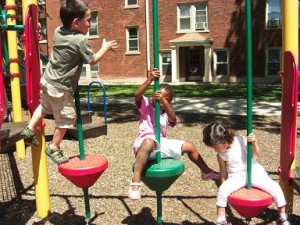Ask most students what his or her favorite  time of the school day is and “recess” often tops the list. While some 40% of all U.S. school districts continue to cut recess time to add more classroom time to the day, more and more studies indicate that recess is just as important as any other time of the school day when considering the holistic needs of children. In fact, the surgeon general recommends that elementary aged children get at least one hour of aerobically active exercise most days of the week. As students get older they should have at the very least 20 minutes of aerobic activity several times a week.
time of the school day is and “recess” often tops the list. While some 40% of all U.S. school districts continue to cut recess time to add more classroom time to the day, more and more studies indicate that recess is just as important as any other time of the school day when considering the holistic needs of children. In fact, the surgeon general recommends that elementary aged children get at least one hour of aerobically active exercise most days of the week. As students get older they should have at the very least 20 minutes of aerobic activity several times a week.
While regular physical activity is important for growing bodies, there are a number of other reasons why recess is a vital part of overall student health. Consider the following:
Recess Provides a Safe Place to Play
In many communities across the country, school recess provides a safe place to play and is the only outdoor time a student gets, especially in cases where a child goes to a childcare provider after school. With the equipment provided by schools, students have a safe place to practice team participation and build coordination and muscle strength. In addition to exercising, students learn to share resources and include others during supervised recess in a school setting.
Physical Activity Increases Attention Spans
Physical activity not only makes the body stronger, but also boosts the mind body connection. Allocating time in the day for a student to burn off excess energy helps the mind focus on academic tasks. If students are given the opportunity to engage in free play and exercise, they will be less distracted in class and will have an increased capacity to focus down on school related tasks. Allowing and encouraging physical activity in the school day leads to better behaved students which means less classroom management issues for teachers and more time for learning
Recess is a Laboratory for Social Skills
During recess, students interact in peers in ways that promote interactive creativity, negotiation, and conflict resolution. At a time in history where more and more children live a largely isolated indoor life with increased interaction with technology, recess is even more important as a vital part of developing necessary social skills. Watch children during a 20 minute recess period and you will observe a wide range of social skills in play including sharing, making and observing rules, verbal and non-verbal communication, and problem-solving.
Recess Models Life-Long Exercise Habits
With an obesity rate in children at an all time high, it is vital that schools take an active role in providing training in lifelong fitness. In the test-crazed climate of many school systems throughout the country which are also struggling against tightened budgets, PE, art, music, and drama are all too often cut out or scaled way back. Students need time in the day to be creative and active, recess provides that opportunity. Instilling in children that it is just as important to exercise as it is to read or do math is a vital life-long habit to encourage.
Conclusion
Physical activity is vital to a child’s development, long term health, and positive social connection with others. Structured physical education classes as well as free play during recess allows for the complementary array of exercise that children need to experience in order to form the lifelong habits that will make physical activity an important part of life for many years to come. Aside from the health, developmental, and social aspects of recess and physical education, self-responsibility, good citizenship, and the ability to enjoy the company of others are all vital components of childhood lost when recess and PE are cut from the school day. Knowing the value and complexity of what physical education brings to student development will help us be active advocates for the health of our children and our students who deserve the very best as they grow to become the future generation of leaders, policy makers, parents, and teachers. Lifelong habits of health begin on the school playground; it is up to us to preserve this vital component of the school day and to educate our leaders on the recent data to strengthen the cause.
Article supplied by Karen Lederer from Dominican University Chicago
Karen is a writer and educator interested in finding and sharing information relating to the education world. Her hobbies include running and photography. You can connect to her on Twitter @Karen_Lederer
 Posts
Posts